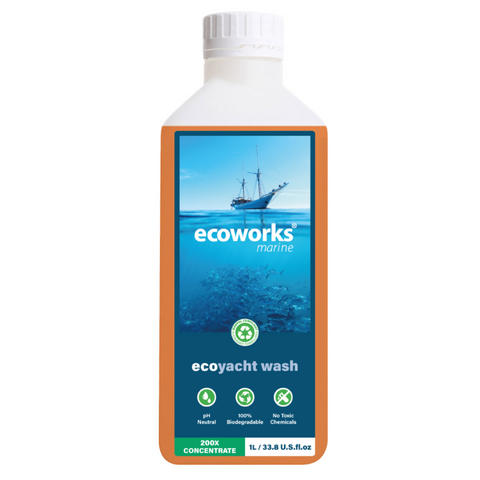10 Ways How To Be More Eco-Friendly On Deck
 Whether you're a deck crew on a 150 metre superyacht or looking after your small sailing dinghy we can all take a few easy steps to help better protect our oceans. So, here is our guide to 10 Ways To Be More Eco-Friendly On Deck.
Whether you're a deck crew on a 150 metre superyacht or looking after your small sailing dinghy we can all take a few easy steps to help better protect our oceans. So, here is our guide to 10 Ways To Be More Eco-Friendly On Deck.
For those larger boats that Marpol Annex V applies to, some of the below are essential to abide by maritime law for others it's a few easy step to take to help protect the ocean playgrounds we love.
1. Wash your rags.
Rags can be washed and used over and over again. Try using old t-shirts as a way of reusing and recycling on board. Just remember to wash them first.

2. Use an eco friendly boat wash.
Reading the ingredients of many common boat wash and hull cleaners and you will find that most common boat soaps contain chemicals and acids that are not only harmful to the environment but also to paint work, GRP, Teak etc.
Not sure which ones to choose? Many boat wash products actually state that they are harmful to aquatic life on their Safety Data Sheets. Even the biggest named brands aren’t as eco as you think! It's very easy these days to find the Safety Data Sheets online, usually downloadable on the brands website. At the very least if you request them, a company has to provide you with a Safety Data Sheet by law.
A good eco-friendly boat wash like our Ecoworks Yachtwash and Hull Cleaner will be derived from natural ingredients and be biodegradable.

3. No plastic water bottles on deck.
Have refillable water bottles either from the boats water filtration system or from one larger recyclable water decanter. Humans drink an average of around 690 litres (182 gallons if you're in the US) so that's a lot of plastic bottles saved.
As a bonus, having a reusable water bottle can also be a great reminder to drink regularly and hydrate.

4. Use an eco-friendly teak scrub.
Move away from the two part teak scrubbing, its what we call negative cleaning, the more you do it the worse the teak gets. You wouldn’t wash your body in acid so why your teak. Its damaging to the wood, opens the cracks up allows moisture in not forgetting how dreadful it is when it runs down you paint work and into the ocean.

 5. Reuse fender covers.
5. Reuse fender covers.
Fenders covers can be reused for protection, modify them to protect life rings when put in storage. Or use them as a means of lifting small sat domes from rigs. Maybe just use them as drop clothes. Fender covers have potentially a long life.

6. Old rope.
These days most marine ropes are made of synthetic fibers like polyester, nylon, and polypropylene for both land and underwater purposes. By throwing these into landfill or letting them loose in the seas you're essentially releasing plastics into the ocean.
You may not have a use for old rope but there are many people that do. Find a local sea school, charity vessel or second hand marine store to donate them to.
As an aside there are more and more companies offering recycled ropes as a more sustainable alternative to virgin rope. If these meet your needs try these instead by creating a circular loop economy we're helping to reduce plastics from reaching the ocean.


7. Eco-friendly rib cleaner.
Use Solvent free, rib cleaners, not only are they good for the environment but they also don’t damage the hypalon. Many rib cleaners will burn Hypalon and rubber materials on a rib due to solvents within them, leaving a tacky feel and attracting more dirt.
You can read more about how our Rib Cleaner is better for the planet and your rib on our Rib Cleaner product page.

8. Stick to one brand and buy larger 5 Litre containers.
Stick to one brand of cleaners and buy larger 5 Litre, or bigger, containers. Products can be decanted into reusable bottles for convenience of everyday use. Buying smaller bottles means more plastic. Always make sure the products you are purchasing come in a recyclable container. 



9. When disposing of paint waste, do so appropriately.
Use closed containers, which can then be deposed of correctly in paint disposal bins at boatyards or waste management centres. Marinas and shipyards should have areas where you are able to dispose of old paint appropriately.


10. Report pollution to the local authorities.
Whether be on land or in the sea. It can't be ignored! Report any pollution to the local coastguard.
That's it some fairly easy and simple ways to be a more responsible deckhand or boater. If you'd like to know more about how to be more environmentally friendly on the interior of your yacht or boat then see our blog on 10 ideas of how to make your yacht interior more eco friendly.
If you're interested in more resources, our fantastic partners the Green Blue Initiative have a number of resources available on their website here.


